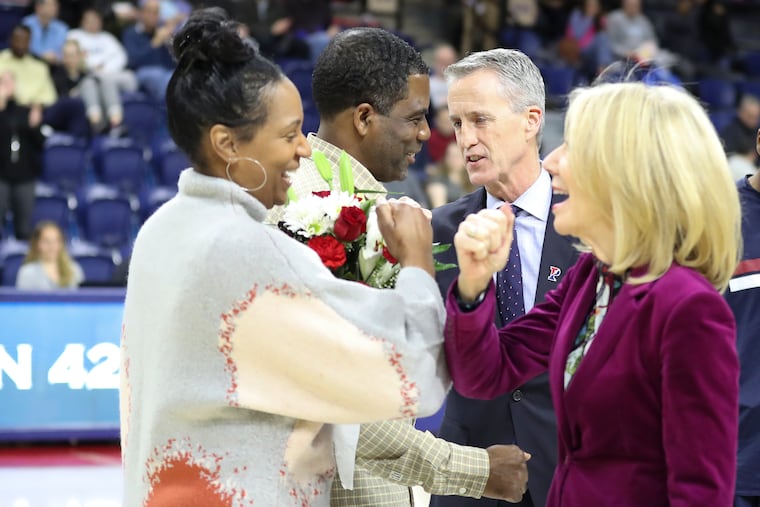As COVID-19 lands in Philly area, some people are keeping their hands to themselves. Others, not so much.
Some people are greeting each other with fist bumps as the timeless, hearty hello of a handshake turns suddenly awkward — people reaching out their hands, then jerking them back.

Shaking hands is out. The Wuhan Shake is in. And as for friendly pecks on the cheek, well, at your own risk.
As COVID-19 stalks the Philadelphia region, having killed and sickened thousands around the globe, people here are quickly changing behavior and surrendering one of the things that makes humans human: touch.
“Not doing the big hugs,” said Cynthia Richards, 66, a retired school teacher who lives in Cheltenham Township. “I’m from the South, and we’re big huggers. You’re seeing a different atmosphere.”
Some people are greeting each other with fist bumps as the timeless, hearty hello of a handshake turns suddenly awkward — people reaching out their hands, then jerking them back. Many opt for knocking forearms or elbows.
One writer suggested that Americans adopt the one-handed, split-fingered Vulcan greeting of Star Trek’s Mr. Spock — “Live Long and Prosper.” Some choose to nod, or blow faux kisses, or pat their hearts and point to their friend, as the coronavirus disrupts everything from sports to business to religion.
On Sunday, congregants at Grace Presbyterian Church in Jenkintown altered the part of the service where they stand and shake hands or hug one another in greeting and welcome. Instead, the pastor invited everyone to stand and wave hello to one another.
At the Cathedral Basilica of SS. Peter and Paul, Father Isaac Haywiser left it up to individual congregants as to whether they wished to shake hands with him as they left.
The Centers for Disease Control and Prevention says the virus can be spread between people who are in close contact with one another, within about six feet, and from droplets produced when an infected person coughs or sneezes. The drops can be inhaled into the lungs of those nearby.
It also may be possible for people to get sick by touching a surface that has the virus on it, and then touching their own mouth, nose, or possibly their eyes. That has people thinking about all the places they perhaps no longer want to put their fingers, such as on a door handle, on the flat black rail of an escalator, or into the holes of a bowling ball.
Around the region, caution has fast become the watchword. Events that draw big numbers of people are being canceled or postponed. For instance, the Philadelphia Union opted to reschedule its “Meet the Team” event after Major League Soccer advised players to avoid handling such items as pens, balls and jerseys to be autographed.
That may help people be safe. But it also means they’re missing out on something they need.
It turns out “Human Touch” is not just a Bruce Springsteen song. Touching and being touched is fundamental. It’s been shown to boost the immune systems of those exposed to the common cold, and to improve clinical outcomes in patients with illnesses such as fibromyalgia and rheumatoid arthritis.
» READ MORE: ‘It’s best to take as many precautions as possible’: Parents and students react to school closings over coronavirus
On Sunday at Logan Square, the International Women’s Day rally went on as scheduled, though planners had considered whether to cancel the event, said organizer Anh Nguyen. Many in the crowd of about 100 knocked elbows in greeting, but plenty threw themselves into hugs and others went ahead and shook hands — though not Joe Piette, 73, of Upper Darby.
“Fist bump,” he said.
In recent weeks, Piette also greeted friends with what’s being called the Wuhan Shake, which looks like a cross between footsy and soccer practice, as friends do a gentle foot-to-foot tap, right and left.
“Every day I feel like this becomes more and more real, the threat of coronavirus,” said Mindy Bartscherer, the volunteer executive director of the Jenkintown Food Cupboard, housed at the Jenkintown United Methodist Church.
The Cupboard has adopted new precautions against the virus, recognizing that about 100 patrons will come and go, sometimes in tight quarters, during the two hours the pantry is open on Thursdays. Many are seniors with chronic health conditions, which could make them especially vulnerable to the virus.
When people sign in, they’re now required to use hand sanitizer. And instead of picking up their goods from selections including dairy, canned vegetables and frozen meats, patrons state their choices to volunteer workers, who then retrieve the food with latex-gloved hands.
When the Princeton-based Robert Wood Johnson Foundation drew about 350 people to its public health conference last week in Jackson, Miss., bottles of hand sanitizer were everywhere. And many people brought their own.
Maybe 40 percent of attendees went ahead and shook hands with others, while 60 percent opted for bumping elbows or even a simple nod, said Tanya Barrientos, the foundation’s director of executive communications.
» READ MORE: New Jersey identifies two more presumptive coronavirus cases, bringing total to six
“People would automatically put their hand out to shake, then there would be this hesitation,” said Barrientos, of Abington. “I didn’t shake hands with people. I figure I should be safe instead of sorry.”